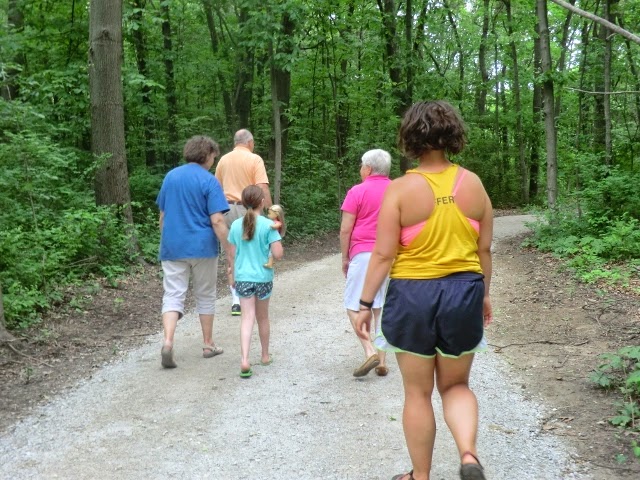.jpg) |
| The cardinal of Illinois flies to Michigan and alights on the apple blossoms... images for our walk from Chicago to Battle Creek, Michigan. |
Our journey through Michigan took us to some interesting places, which we enjoyed. We ate lunch at the lakeside, in Saint Joseph. I think that the most interesting place name that we visited was Paw Paw. This oddly named village is in the heart of Michigan's wine country so, if you are an aficionado of wine, Paw Paw is for you. It was a very appealing village and the unusual name just added to my fascination with it. And speaking of names and places, we saw the White Rabbit Bed and Breakfast, the Episcopal Church of the Mediator, a farmers market, various art galleries, and more.
I was startled to see people riding motorcycles without benefit of helmets. I was told that the state's helmet law allows for some riders to go without their helmets. They have to be over the age of 21 and carry a certain amount of medical insurance and have motorcycle training. But still... to me, it seems like a bad idea. I made up songs for Michigan's motorcyclists, depending on whether or not they were wearing helmets. They are sung to the tune of "We are singing in the light of God."
For the helmetless riders: Put a helmet on that precious head, put a helmet on that precious head. Put a helmet on that precious head, put a helmet on that precious head. Wear your helmet because we like you. Put a helmet on that precious head. Wear your helmet because we like you. Put a helmet on that precious head.
For the riders wearing helmets: You look handsome in your dashing helmet; it really makes you look debonair. You look handsome in your dashing helmet; it really makes you look debonair. You set fashion trends with that helmet. You should be in a magazine. You set fashion trends with that helmet. You should be in a magazine. (not a coffin)
Even in rural areas, it was apparent that Michigan was part of the rust belt. Everything was green and alive but so many of the buildings were decaying.
.jpg) |
| The bridge overlooked the Galien River. We saw people in canoes and kayaks enjoying a day on the river. |
t.jpg) |
| The board walk |
.jpg) |
| Here is Ginger Bear II, enjoying some relaxing time |
.jpg) |
| Farmers market in rural Michigan. |
.jpg) |
| I'm late, I'm late for a very important date! |
.jpg) |
| Some building signs called out for a photograph... |
.jpg) |
| Barbara calls for an end to drone warfare. |
.jpg) |
| I got to borrow these colorful socks. They were soft and comfortable for my sore feet. |
.jpg) |
| Our group, without me, because I was taking their picture. |
.jpg) |
| Father Dan Scheid of Benton Harbor and his amazing shoes. |
.jpg) |
| Father Dan Scheid and Senji. |
.jpg) |
| Father Dan Scheid, Brian Terrell, a gentleman who I think works in St. Augustine's (I seem to have forgotten his name, unfortunately), and Frank Pauc. |
.jpg) |
| Father Dan, Ceylon, and Senji |
.jpg) |
| Immaculate Conception Church. |
.jpg) |
| Also at Immaculate Conception Church |
.jpg) |
| This is a lovely display of flowers in a garden in Michigan. |
.jpg)
.jpg)
.jpg)
.jpg)
.jpg)
.jpg)
.jpg)
.jpg)
.jpg)
.jpg)
.jpg)
.jpg)
.jpg)
.jpg)
.jpg)
.jpg)
.jpg)
.jpg)
.jpg)
.jpg)
.jpg)
.jpg)
.jpg)
.jpg)
.jpg)
.jpg)
.jpg)
.jpg)
.jpg)
.jpg)
.jpg)
.jpg)
.jpg)
.jpg)
.jpg)
.jpg)
.jpg)
.jpg)